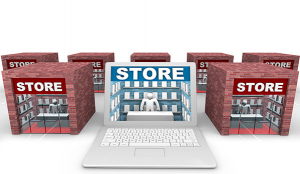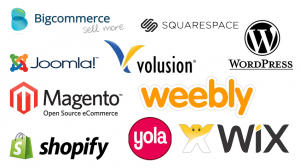
 Data Structure
Data Structure Networking
Networking RDBMS
RDBMS Operating System
Operating System Java
Java MS Excel
MS Excel iOS
iOS HTML
HTML CSS
CSS Android
Android Python
Python C Programming
C Programming C++
C++ C#
C# MongoDB
MongoDB MySQL
MySQL Javascript
Javascript PHP
PHP
- Selected Reading
- UPSC IAS Exams Notes
- Developer's Best Practices
- Questions and Answers
- Effective Resume Writing
- HR Interview Questions
- Computer Glossary
- Who is Who
How an E-Commerce Store Decreases Your Business Capital
For those of you who have your own brick-and-mortar store (or are planning to open one), I have a quick and easy exercise. Let’s start with few questions:
- How much of your capital investment went towards rent?
- How about your internet service provider, Electricity and other utilities?
- For Staff and contractors?
- How much stock do you have on hand, and are you able to move them?
- Where do your customers reside?

Keep your answers in mind. We’ll get to those shortly.
- Finally, do you want to make more money using less up-front capital, while spending less of your capital investment on expenses?
To be sure, your answer is “Yes,” so we’ll proceed Accordingly
To stay competitive, whether that means to move the product or roll out your services faster than the rest, you wouldn’t want to depend on walk-in clients, or cold-calls to get things moving. Restricting yourself to these methods will inevitably bottleneck your efficiency. Instead, many businesses turn to the internet to expand their reach.

At the bare minimum, most businesses have an email address or a social media account to facilitate individual transactions with clients and coordinate with suppliers. But there’s more to the Internet than this, and to win at this game, you have to be ready to play.
Electronic commerce, or e-commerce is a term used to describe any type of business or commercial transaction that involves the transfer of information via the Internet. Different types of businesses and industries, including auctions, consumer-based retail websites, online services, and exchanges between corporations are only a handful of examples that illustrate the breadth and depth of e-commerce.
With e-commerce, you as a marketer have the advantage of purchasing the item from your supplier upon receiving the order placed by your customer. This gives you unparalleled flexibility with your inventory since you no longer need to have the item in stock, waiting around for a buyer to come around.

With the liberty of using a virtual stockroom. It becomes more important to keep track of your inventory closer than in a traditional one. With revolving stocks, items are constantly on the move, and it’s up to you and your supplier to have a good rapport and be on the same page. Communicating with them on a weekly basis, or even more frequently, would not be out of the ordinary.
The cost of monthly rent, or monthly amortization payments if you actually choose to buy the property to build your brick and mortar store, can represent a large proportion of your expenses. Also, the cost of maintaining staff, equipment and utilities add up quickly. Once you factor the insurance costs and incidental expenses, you are left with a very small amount of cash to take home.
In comparison, setting up an e-commerce store requires a minimal starting outlay. To get started, you just need the following:
Hosting provider – Depending on which company you choose, the cost for domain name hosting can range between $5 and $10, depending on the package. You need to research over the web for some of the best hosting providers available in the market.

- E-commerce platform – Although some e-commerce platforms come packaged with a hosting provider, you can find some of the best eCommerce platforms that suits your needs in the article by Bill Carmody entitled Top 5 E-Commerce Platforms in 2016.
- Yourself (yes, yourself alone!) – By purchasing an e-commerce platform, you also receive free training. The platform will assign one of their in-house technicians to provide you with free training to set up and navigate your store. As professionals, they have worked with clients with a wide range of experience, from first-time marketers to seasoned veterans, so you can expect them to be patient and accommodating. Once you’re up and running, you won’t need to hire a staff or worry about training, salaries, and other costs.
E-commerce is here to stay. It is the present and the future of business as we know it, and it will continue to grow as technology becomes more advanced. It is very likely that online marketplaces will eclipse most, if not all, the retail industries in a very short time from now. With that, I recommend you to give it a try and sell your products online.
With an unlimited reach to your worldwide customer base, low-cost upfront investment, and ease of startup, the small risk is outweighed by the potential huge rewards.

